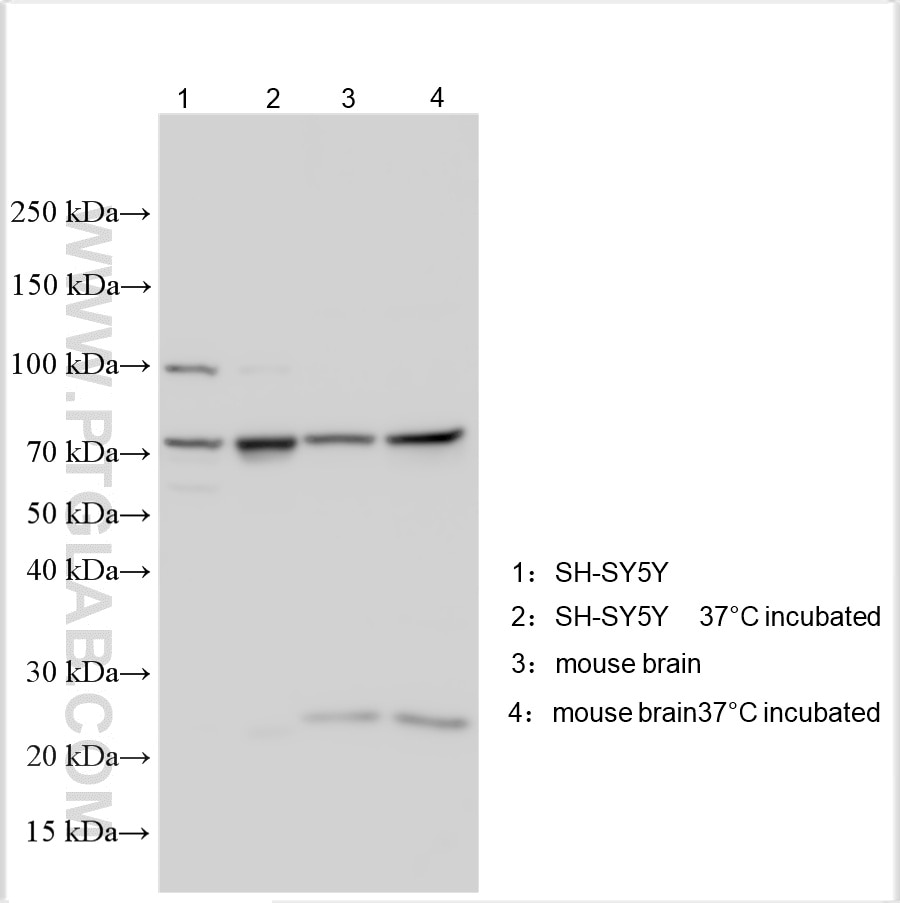KCNV1 Polyklonaler Antikörper
KCNV1 Polyklonal Antikörper für WB, ELISA
Wirt / Isotyp
Kaninchen / IgG
Getestete Reaktivität
human, Maus, Ratte
Anwendung
WB, ELISA
Konjugation
Unkonjugiert
Kat-Nr. : 12684-1-AP
Synonyme
Geprüfte Anwendungen
| Erfolgreiche Detektion in WB | SH-SY5Y-Zellen, Maushirngewebe |
Empfohlene Verdünnung
| Anwendung | Verdünnung |
|---|---|
| Western Blot (WB) | WB : 1:500-1:1000 |
| It is recommended that this reagent should be titrated in each testing system to obtain optimal results. | |
| Sample-dependent, check data in validation data gallery | |
Produktinformation
12684-1-AP bindet in WB, ELISA KCNV1 und zeigt Reaktivität mit human, Maus, Ratten
| Getestete Reaktivität | human, Maus, Ratte |
| Wirt / Isotyp | Kaninchen / IgG |
| Klonalität | Polyklonal |
| Typ | Antikörper |
| Immunogen | KCNV1 fusion protein Ag3376 |
| Vollständiger Name | potassium channel, subfamily V, member 1 |
| Berechnetes Molekulargewicht | 500 aa, 56 kDa |
| Beobachtetes Molekulargewicht | 70 kDa |
| GenBank-Zugangsnummer | BC028739 |
| Gene symbol | KCNV1 |
| Gene ID (NCBI) | 27012 |
| Konjugation | Unkonjugiert |
| Form | Liquid |
| Reinigungsmethode | Antigen-Affinitätsreinigung |
| Lagerungspuffer | PBS with 0.02% sodium azide and 50% glycerol |
| Lagerungsbedingungen | Bei -20°C lagern. Nach dem Versand ein Jahr lang stabil Aliquotieren ist bei -20oC Lagerung nicht notwendig. 20ul Größen enthalten 0,1% BSA. |
Hintergrundinformationen
Potassium voltage-gated channel subfamily V member 1 (KCNV1, also known as Kv8.1) is a voltage-gated potassium channel that plays a role in the repolarization phase of the action potential (PMID: 39003683). It regulates neuronal excitability and is essential for maintaining normal electrical signaling in the nervous system (PMID: 38911266). The function of KCNV1 may also include inhibiting specific types of outwardly rectifying potassium channels (PMID: 8670833).
Protokolle
| PRODUKTSPEZIFISCHE PROTOKOLLE | |
|---|---|
| WB protocol for KCNV1 antibody 12684-1-AP | Protokoll herunterladen |
| STANDARD-PROTOKOLLE | |
|---|---|
| Klicken Sie hier, um unsere Standardprotokolle anzuzeigen |


